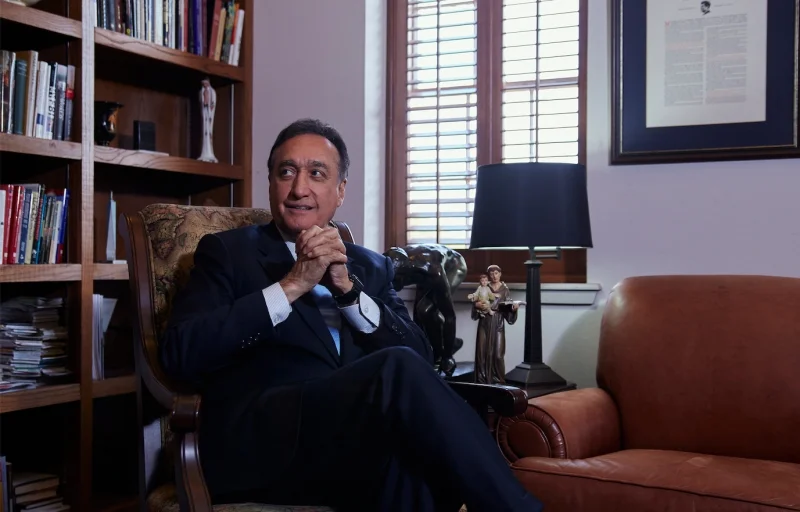Henry Cisneros: Building the Heart of A City
Story By: Kristian Jaime
JASON GILMORE
For San Antonio native Henry Cisneros, the many hats he has worn should more aptly be considered several professional lifetimes.
The former mayor of the Alamo City may be a hometown boy at heart, but he has spent a career establishing himself as a champion for the housing and urban renewal that is vital to sustaining growth in American cities.
Since leaving politics after being appointed Housing and Urban Development (HUD) Secretary from 1993-97 under President Bill Clinton, his is now focused on real estate development.
“CityView is the home building business, an urban projects residential company that has raised funds totaling over $1.5 billion. It involves 87 projects in 13 states, and we’ve made a specialty of building in core cities,” said Cisneros.
While business interests have taken a national approach, the founder and chairman of CityView has never strayed too far from his roots.
Before making the move to Washington, D.C., he was at the helm of the seventh-largest city in the country from 1981-89. The unprecedented growth also has spurred additional funding for detached single-family housing and apartment living.
“Here in San Antonio, we’re working with the area around Mission Concepcion in the southern part of the city, and that will be a very attractive apartment complex,” Cisneros said. “I’m even invested in an infrastructure company that will be doing larger, non-residential projects across the country, including the VA hospital area in Cleveland. While I’m known for housing, as mayor, we invested in downtown, the convention center and flood control.”
Yet his first love has always been municipal development. That became evident while serving as HUD Secretary and was essential to taking his place at Siebert Cisneros Shank & Co., LLC. Formerly Siebert Brandford Shank, the firm is a full-service investment banking and financial services company that was founded in 1996. Their services include everything from underwriting bonds responsible for city improvements to community assets responsible for nurturing an influx of population.
“As HUD Secretary, I traveled to hundreds of U.S. cities across the 50 states, and that helps us understand how we can help people with municipal matters like bond issues for schools, airports and infrastructure. This was a great opportunity to build a minority-owned firm,” Cisneros added.
The unique perspective provided by developing and ensuring the next wave of community- based construction is more than a comprehensive business strategy. It highlights the very reason why such investment is necessary.
“The common theme [in all these projects] is developing cities and their urban areas. I’m convinced now more than ever that the strength of America revolves around our cities. You see that in Dallas with the airport hub, and in Houston with its energy sector,” Cisneros said.
Texas has quickly become the focal point of an emerging Southwestern economy, with Dallas, Houston and San Antonio forming the “Texas Triangle.” Not only does it represent 75 percent of the state’s population, but millions of dollars in commerce and technology flow through there.
It has become home to the headquarters of some of the largest corporations in the nation and it employs thousands in growing industries like biotechnology and the energy market.
“I think the Texas Triangle is going to take its place along the East Coast and West Coast cities, and what we might call the ‘heartland cities’ centered around Chicago, as the next major regional economic phenomena in the United States,” said Cisneros.
Yet Cisneros does not sugarcoat the dilemma of the American dream.
After earning a BA and a master’s in Urban and Regional Planning from Texas A&M University, he earned a master’s degree in Public Administration from Harvard University, studied urban economics at MIT and completed a Doctorate in Public Administration from George Washington University.
In short, any measure of achievement is only gained through study and hard work. Fortunately, those are values already engrained in the Hispanic culture.
“I am a great believer in the American spirit of ingenuity. People do not give up on their cities. America is blessed that the largest immigrant group is Latino,” Cisneros explained.
“We are 55 million today, and that will be 100 million by 2040. That will make us the largest minority group in the United States. They are so aligned with the American ideas of hard work.”
With the recent presidential election, there was no shortage of rhetoric concerning the benefits and drawbacks of immigration policy. But what was not in dispute was the economic rise of some areas and the decline of others. That, coupled with an emerging Latino population in the national workforce, led many to call for stricter standards for those who wanted to make the United States home.
“There’s a sense that the American economy has failed many people, especially in the Midwest, Rust Belt cities,” Cisneros explained. “But when you overlay the change that’s happening with immigrants entering those areas, you see different languages and community institutions going bilingual. People get frightened because they think the culture of America is changing.”
For more on Henry Cisneros, Check out our print and digital editions

